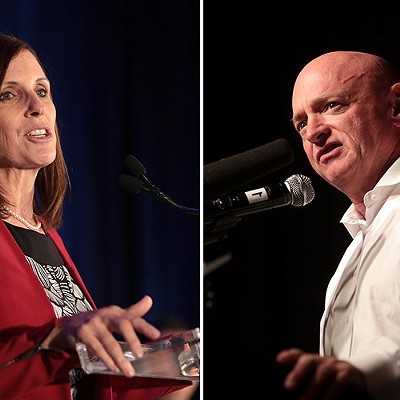"There's not a soul out here who wants to be in Tucson," Whitehouse says. "That's why we moved out here."
And he's especially unhappy with the City Council's recent vote for a more aggressive annexation policy that includes swallowing the rapidly growing hamlet of Corona de Tucson, located some seven miles south of Interstate 10 on Houghton and Sahaurita roads. Recent annexations of vacant state land have brought the city to within two miles of the rural community.
Whitehouse has a considerable stake in the outcome. If the city does annex the area, it will take over emergency services, and Whitehouse's fire district, which covers about 28 square miles, will be eliminated. On top of that, he fears once they've been annexed, he and his neighbors will be neglected by the city.
"They're not going to provide us any services," the wiry firefighter gripes. "They're just going to take our money for their boondoggle city."
While city officials insist Whitehouse and his neighbors won't be annexed for several years at least, planners are now taking steps to make it easier to absorb the area in the future.
One hardball tactic they've adopted: refusing to supply water for new housing subdivisions until developers agree to sign a pre-annexation agreement that obligates future homebuyers to agree to annexation. Since Tucson Water holds a virtual monopoly on water rights in the area, projects can't go forward unless developers acquiesce to the deal.
"What we're trying to do, essentially, is gain a little more control over what goes on out there, so one of the ways in which the city can do that is have a pre-annexation agreement with those people so that when the city is contiguous, those developments annex in," says Mitch Basefsy, spokesman for Tucson Water.
The city's aggressive annexation policy is also driven by money. The state distributes money to cities based on their population, so residents living in unincorporated Pima County represent potential dollars to the city's coffers.
Albert Elias, director of the city's planning department, calls the new policy "sound," but says tensions have been erupting regarding recent dealings with developers who had already begun projects in the area.
The new policy has been implemented by staff during the last year in anticipation of approval by the Tucson City Council, which is scheduled to examine the issue in September, according to Elias.
Mayor Bob Walkup says using water as leverage in the annexation process is "the right thing from the standpoint of ratepayers already within the city water system." But asking developers in the middle of projects to sign the agreement was "a bit crosswise."
Walkup foresees that developers will be asked to sign a pre-annexation agreement before receiving water service in the future.
"It's reasonable policy to say that if you'd like to be hooked up to city water, and you're in the county, we sure would like you to become part of the city," says Walkup, who characterizes the current controversy a minor hiccup.
But Ed Taczanowsky, executive vice president of the Southern Arizona Homebuilders Association, says his membership has serious concerns about the new policy, especially since it will bind future homebuyers to agree to annexation.
"As an association, we just don't think it's right to preclude a resident from his right to vote on whether he's in the city or in the county," Taczanowsky says.
Taczanowsky, who describes recent meetings with city officials as "frustrating," says SAHBA supports the concept of annexation in general.
"We think it's good urban planning," Taczanowsky says. "But we think it should be sold on the services and the ability of the services that the city could provide--like police, fire, parks. We don't think it should be mandated and strong-armed."
Taczanowsky says the tactic is also inappropriate because "Tucson Water was supposed to be a regional water provider, and it was not supposed to be in conjunction with city limits. If they want to change policy, that' s up to them, but I don't think you can hold an industry hostage that has plans out six, eight, maybe 10 months ahead with a policy change that happens overnight."
Ward 5 Councilman Steve Leal disagrees with the proposed policy, saying that it strips citizens of their right to self-determination.
"If we want people to come into the city of Tucson and have a relationship with us, it is not in our interest that we are heavy-handed and manipulative," Leal says.
Pima County Supervisor Ray Carroll, who represents the area, says the city's tactics are "not appropriate."
"It looks like the city's non-diplomatic strategy has really backfired on with the residents of Corona and Rincon Valley," Carroll says. "I don't think they're winning any friends."


















